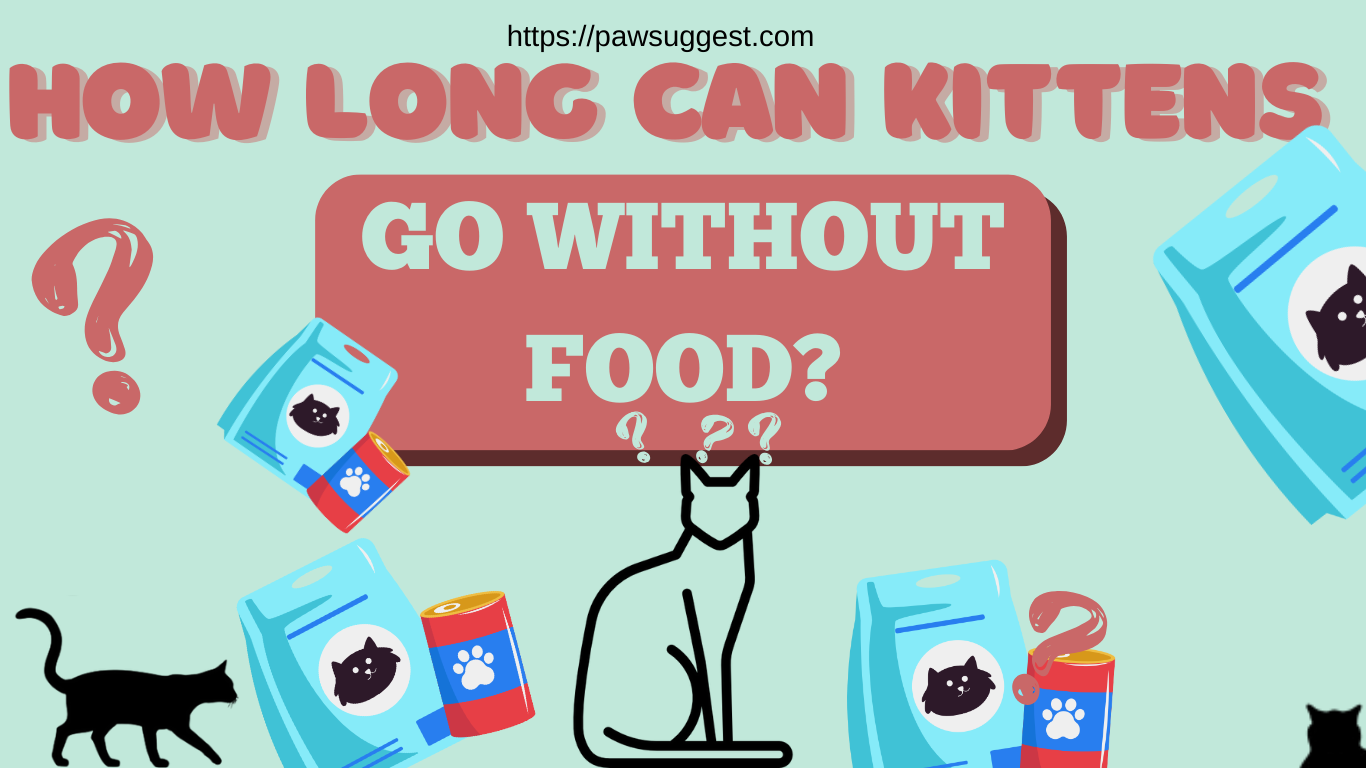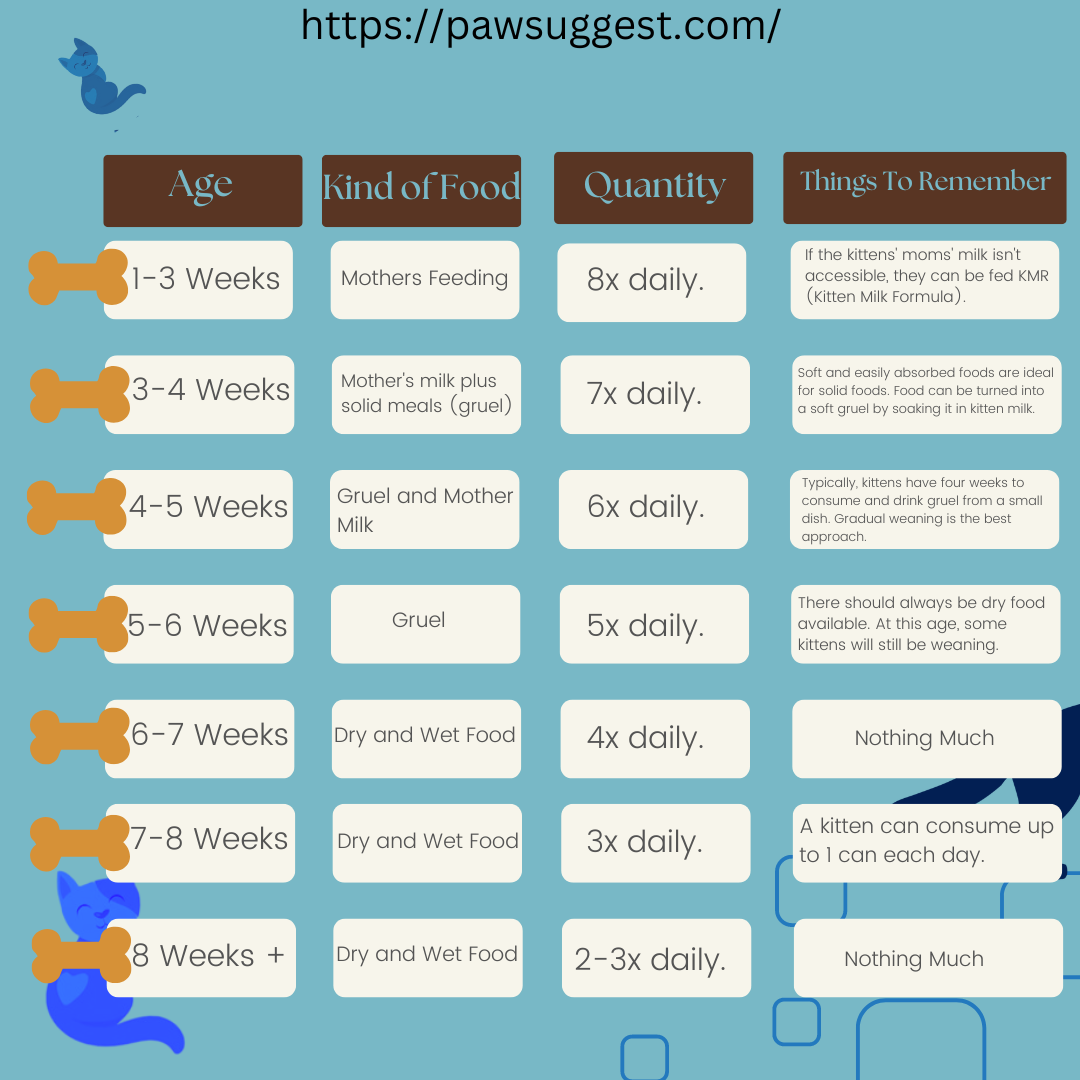Kittens brighten our lives with their energetic behaviors. Conversely, they are choosy eaters who will only eat their favorites!
But if your kitty stops eating, you might wonder:
“Is it normal? Or How long can kittens go without food?”
A healthy adult cat goes more than 24 to 36 hours, but kittens that go more than 12 hours without eating may experience negative impacts.
Walk through the guide to get your answer!
How long can kittens go without food?
Getting a new kitten is one of the most thrilling experiences. It is required of us as cat owners to give our kitties the best care possible. It includes attending to their food schedules and other needs.
Generally speaking, a healthy kitten can spend up to two days without feeding. They will, however, grow thin and malnourished if they go without food for a day.
Most likely, it requires attention from an emergency veterinarian. Because of their small stomachs, they need to be fed often to receive enough nutrients and energy.
They must also be supplied with food appropriate to their age and size. For example, during the first few months, newborn kittens grow from their mother’s milk.
What, Why, And How of Kittens’ Food?
Taking a new kitten into your home is a delightful and touching moment. Like human newborns, kittens have unique nutritional requirements that must be satisfied to promote healthy growth and development.
Let’s examine these requirements and how you may provide your small feline friend with the healthiest diet possible.
Is It Normal For My Kitten To Not Eat?
A kitten not eating is pretty typical. This is especially true if anything has changed—for example, if you newly adopted them or are changing the food they eat.
A kitten may stop eating for the common reasons listed below:
● Loss of routine:
In order to make sure they are adequately hungry and capable of breaking down and assimilating their last meal.
● Unfamiliar food
A kitten should be introduced to new foods gradually. If it is suddenly shifted, your kitten can become anxious and experience a decrease in appetite.
● Unpleasant and disturbing environment
Cats and kittens can be picky about where they eat. Ensure they have a peaceful, quiet, and comfortable place to dine at your house. Make sure their meal isn’t near the litter box!
● They are receiving too much food.
Check that the serving portions for your kitty are small enough. Treats should be handled carefully.
● Your feline is anxious.
There are several reasons why it might happen. Being stalked by a dog, taking a vehicle ride, discovering new sights and smells, going to the veterinarian, etc.
● Having a disease or accident
Although other behaviors are frequently associated with it, a reduced appetite is likely to last longer than one or two meals.
● Unclean food container
Cats and kittens keep themselves very tidy and enjoy eating from clean containers. Another thing that can delay them is any leftovers from previous meals.
● Container Type
Food bowls should be shallow and wide because cats tend to get put off when their whiskers contact the sides of the bowls.
How Do I Make a Kitten Eat?
You may try a few valuable tactics to increase a kitten’s appetite if they’re not eating.
The ones that are most highly suggested are:
- Think of a different food brand.
- Taste food with a variety of flavors and textures.
- Make sure you wash the bowl well before putting any food in it.
- If possible, think about relocating the feeding bowl to a different room in your house, preferably somewhere calm and serene.
- Take into account bringing the food to room temperature. It shouldn’t be too hot or too cold.
- Make sure the meal bowl is large and shallow, as glass bowls usually function well.
- Serve both wet and dry food, although the wet is now preferred.
- Try adding some KMR (Kitten Milk Formula) to dry food if you have any.
- Ensure that every 30 to 60 minutes, any moist food is replaced with fresh food.
- Your kitty can consume the dry food you leave out whenever they like it.
- Make a feeding plan and feed your pet at specified times.
- For more guidance, you may speak with your veterinarian.
What Happens If A Kitten Skips Meal?
The outcome for a kitten that skips meals is solely determined by how long they go without food and whether they drink any water at all during that period.
Additionally, their size and age play a role. However, if a kitten doesn’t eat, it could quickly become underweight and dehydrated.
This can quickly result in lethargy and other harmful effects from consuming too little energy. It may occur in a matter of hours.
From there, your kitten’s situation may get far worse. Regretfully, if cats are not fed enough, organ failure can strike them soon.
They don’t have livers like humans and other animals, so their bodies can’t function without food. Stated differently, their body’s energy reserves are not effectively utilized by them.
Older cats can only go without food for four to twelve days. This can happen in as short as two days for a kitten because of their increased energy requirements and faster metabolism.
In any case, organ failure is the primary cause of the same process.
Frequently Asked Questions (FAQs)
1. How long can kittens go without food?
Compared to adult cats, kittens are more brittle and usually survive 24 to 48 hours without food. But throughout this period, it’s critical to watch their hydration level carefully.
2. When is it okay to feed my kitten solid food?
You can start giving your kitten solid food with water in the fourth week. You can start feeding them solid meals after the fifth week.
3. Is it necessary to feed kittens at night?
Kittens younger than 4 weeks should be fed every 3–4 hours daily. As long as the kittens are fed four or five times during the day, feeding them at night is unnecessary.
Summary
You now understand how long a kitten can go without eating. Kittens require frequent little meals.
Their bodies cannot sustain them for long without consistent and regular access to food and water because of their high energy needs.
Never allow a kitten to go more than 12 hours without meals. Always seek advice and help from your veterinarian whenever in doubt.
Here’s to many happy meals and purr-fect moments with your beloved kitten!
Related:
Can I give my cat his antibiotic early?
Why Does My Cat Have A Small Head?



